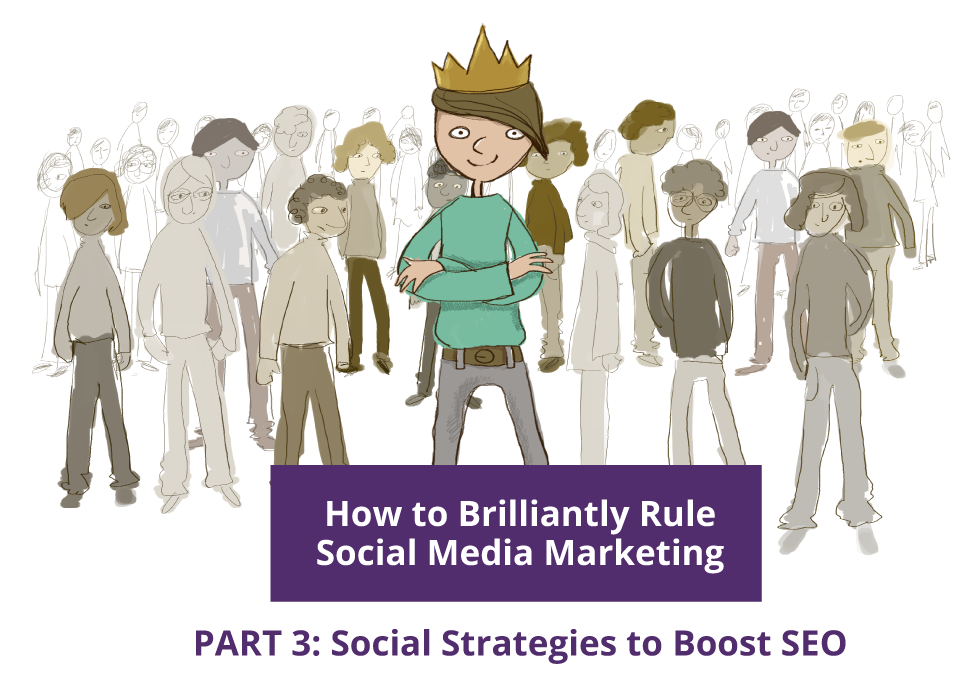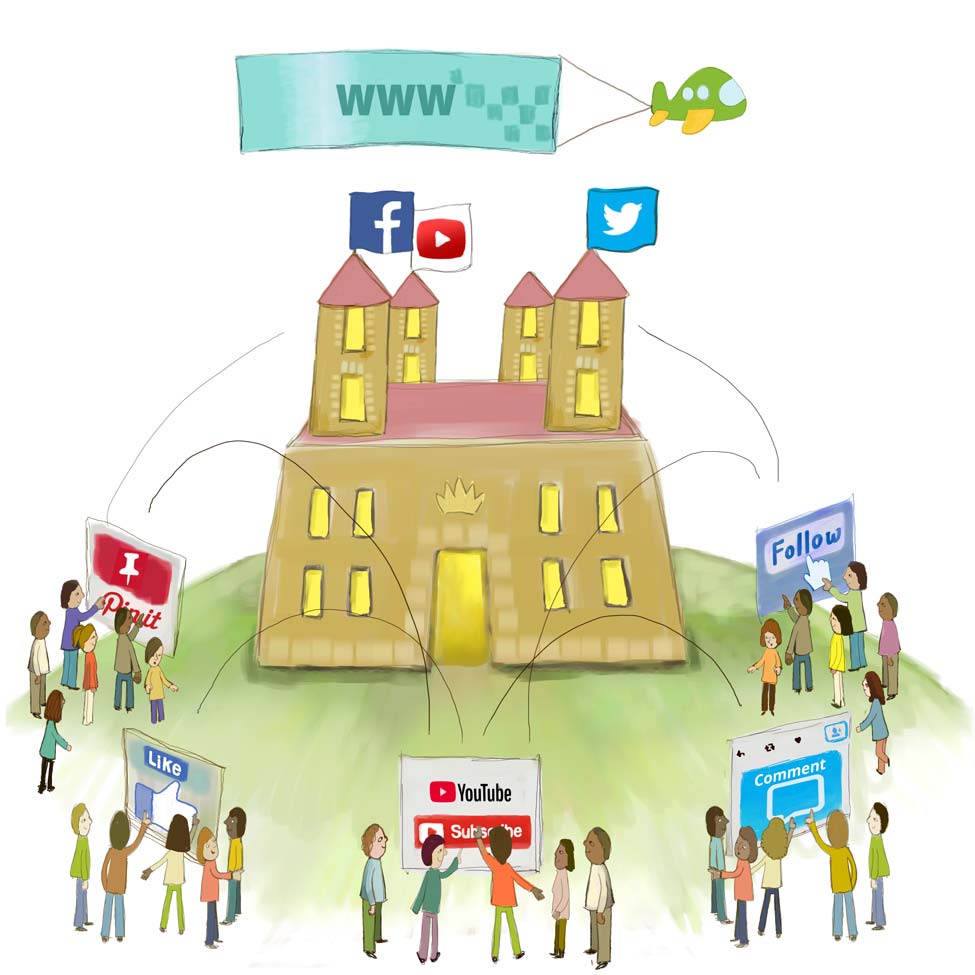How to Brilliantly Rule Social Media Marketing—Part 3: Social Strategies to Boost SEO

This article is part one of our three-part series on social media marketing:
Social Media Marketing Part 1: Understanding Social Media
Social Media Marketing Part 2: Aligning Social with Your Blog
Social Media Marketing Part 3: Social Strategies to Boost SEO
Social media marketing can bedazzle your marketing programming with boosted Search Engine Optimization (SEO), shining a bright light on your website.
What are Today’s Top Search Engines?
Traditional Search Engines
Popular traditional search engines include Google, Yahoo and Bing.
Google owns about 92%1 of the search share in Canada, so it’s the primary search engine for which we optimize our clients’ websites.
These search engines crawl the web’s billions of publicly available web pages, index them in databases called search indexes. These pages are ranked based on relevance to search queries and displayed on the search engine results pages (SERPs).
People can enter search keywords into the web browser’s search bar to find information online.
Website SEO involves ensuring your website is ranked highly by search engines for the search terms people use to find your services.
Social Media Search Engines
Additionally, search engines include social platforms such as Instagram, Facebook and YouTube.
Social media platforms have search bars or other search functionalities where users can find products and information based on usernames, mentions, trends, hashtags, location tags and products.
Social media SEO involves ensuring your social media profiles and content are clearly described and tagged so the platform can display them in relevant social searches.
Can Social Media Actually Improve Your Website SEO?
Yes and no.
Search engines like Google, Yahoo, and Bing use various quality measures to evaluate and rank websites based on their relevance. However, they do not provide a comprehensive list of these measures in detail.
There has been ongoing debate about whether social signals play a role in these measures. While we may not have definitive answers, each change to the ranking algorithm introduces new factors for assessment. Just because social signals may not be a significant ranking factor at present does not mean they won’t become important in the future.
Even if search engines do not consider social interactions as a quality measure—which is highly unlikely—many social networks function as sophisticated search engines of their own. Implementing a social strategy that incorporates effective SEO practices can significantly enhance your brand’s visibility on social platforms.
Social Backlinks
When other people value your content enough to link to it, that’s a great indicator of quality. Consequently, backlinks have traditionally led the charge when it comes to off-page ranking factors.
It’s easy to bag a few backlinks to your website by placing links from social channels, but do these have an impact on SEO? The answer is probably not. Links from social media platforms are typically “nofollow” links, meaning Google doesn’t directly count them as backlinks. Moreover, brands linking to their content hardly provide an unbiased measure of quality. However, the amount of traffic arriving on a website almost certainly does, as do bounce rates and engagements. Highlighting your high-quality, original content on social media can potentially, therefore, boost your website’s ranking.
Social Shares
Google remains tight-lipped on whether social shares impact SEO, but there does appear to be some relation between shares and position in the rankings list.2 However, it is still unclear whether the shares actually lead to a higher position, or websites with a better position naturally get more shares.
Bing3 and Yahoo, the less popular search engines, do consider social media engagement when ranking your website.
The bottom line is that any activity that highlights the authority and value of your brand to a search engine is well worth the effort. When you include social share buttons on your blog posts, you make it easy for people to share your content on their social channels. Businesses sharing your content on social media are sending out a brand signal to search engines that speaks to your brand’s validity, integrity and consistency. As a result, this helps increase your brand visibility and amplify any SEO benefits.
Social Reputation
The internet is a big place, and the quality of websites and social media profiles varies widely. Social media channels don’t limit or scrutinize their users per se, and anyone can sign up for an account. This means that if external web search engines and internal social search engines alike are going to use social signals as a measure of quality, they need to be able to determine which profiles are worth noting.
What they’re really looking for are active, authentic profiles rich in meaningful connections, where users frequently engage with one another. On the flip side, fake or low-quality accounts are quite obvious. They typically have limited followers and often revolve around pushing one specific product. Engagement from these profiles can actually harm your social authority instead of boosting it.
So, how do you maintain a stellar social reputation? Start by steering clear of those low-quality profiles and instead focus on providing a genuine, valuable experience to your audience. Building a strong social authority not only enhances your brand’s credibility in the eyes of search engines but also resonates with your followers.
The relevance and usefulness of the content you share will also have an impact on your social reputation. Great quality, targeted posts that attract a high number of likes, shares, and traffic are indicative of quality. Even if they do not currently factor in rank, they indicate that your social media strategy delivers an excellent service that your followers value.
Social Strategies to Boost SEO

Social media and online marketing will always be linked; they are both inbound strategies with a significant bearing on brand visibility and perception. As such, several social strategies can be leveraged to make the most of known SEO ranking factors.
1. Link Building
High-quality content doesn’t just give people on your social network something interesting to read. It also gives them valuable information to share on their channels. These shares increase your site traffic and boost authority. Moreover, they expose your content (and, by extension, your brand) to an even more extensive network of people who, in turn, may link to it as well.
2. Local Relevance
Thanks to the internet, even the smallest brands can compete on an international scale—but there are still advantages to thinking locally. Most social channels now feature geolocation tags, which are great for increasing your relevance among a local audience. They might even push your social pages or posts to the top of search engine rankings for location-specific terms.
The easiest way to make use of these features is to post pictures and content whenever your business takes part in a community event or visits a local trade show or festival. You can reinforce your relevance and authority within the community by targeting engagement from residents or interacting directly with other local businesses.
3. Brand Awareness
While developing brand awareness certainly won’t hurt SEO authority, there is evidence to suggest that an increase in branded searches—users searching for your business by name—may actually deliver an SEO boost. If this is the case, then a great social media strategy that increases brand visibility and awareness will have a positive effect on SEO.
4. Ranking More Than Once
In their quest to be ever more useful, Google and Bing have both started anticipating a user’s eventual needs by including additional information such as maps, videos, images, headlines and business reviews in their search results. Social profile pages are also up there, meaning that a well-optimized page and posts that include relevant keywords will give your brand yet another opportunity to rank.
The Takeaway
Search engines are committed to delivering the very best user experience, and SEO is the practice of highlighting how relevant and valuable your content is to particular searches.
Whatever impact social media has on SEO, following good practices not only maximizes your brand’s chances of ranking well but also ensures the best possible experience for your users.
Your Turn
For some brands, social media is simply a box-ticking exercise. Many fail to recognize the importance of a comprehensive, well-considered social strategy—and in doing so, they limit the reach of their businesses.
Take the time to understand your audience, their expectations of key social spaces and why they use them. This information is essential for providing high-quality, original content. It is the cornerstone of a successful social media marketing strategy. It will help you to control the perception of your brand, enhance awareness and generate sales leads.

To make social media marketing a rewarding endeavour, brands focus on three key actions. First, they efficiently create original content that resonates. Second, they diligently monitor engagement metrics and sales funnel analytics. Third, they embrace adaptability, adjusting their social activities in response to insights gained. Navigating your way through this fast-moving, ever-changing world of social strategy—and understanding their alignment with your brand objectives—is no quick and easy task.
No Worries, We Have Your Back
For most small businesses, it’s simply not possible to hire a full-time team of specialists to establish performance indicators and adapt social campaigns to achieve lead generation goals. But you can still access the skills and expertise needed to devise and run a world-class strategy.
The Mindspin team specializes in business marketing and can manage your social media for you as part of a comprehensive annual marketing program. This includes creating a content strategy, writing posts, designing visuals, producing videos, scheduling content, and analyzing performance. While we manage the bulk of your social media marketing in conjunction with lead acquisition and advertising, we may suggest training one of your employees to participate. This will allow you to share more intimate updates quickly, such as photos and stories about clients using your services, staff experiences, and live event updates.
Through comprehensive annual marketing programs, Mindspin is ready to help reinforce your castle with a shining online presence, securing your social media kingdom.
This article is part one of our three-part series on social media marketing:
Social Media Marketing Part 1: Understanding Social Media
Social Media Marketing Part 2: Aligning Social with Your Blog
Social Media Marketing Part 3: Social Strategies to Boost SEO
Tanja Groos, Founder and CEO, Mindspin® Studio Inc.
Tanja Groos is CEO Mindspin with more than 20 years of experience in branding and digital marketing. Her work has been published and awarded. Her leadership has tripled sales within a year, surpassed top industry competitors online, and enhanced brand credibility for her clients.
Follow Tanja on LinkedIn
Footnotes
- Statcounter.com. 2019. Search engine market share. Statcounter.
- CognitiveSEO.com. 2018. Social Signals SEO Influence (2016). CognitiveSEO.
- Bing.com. 2019. Webmaster Guidelines. Bing.











